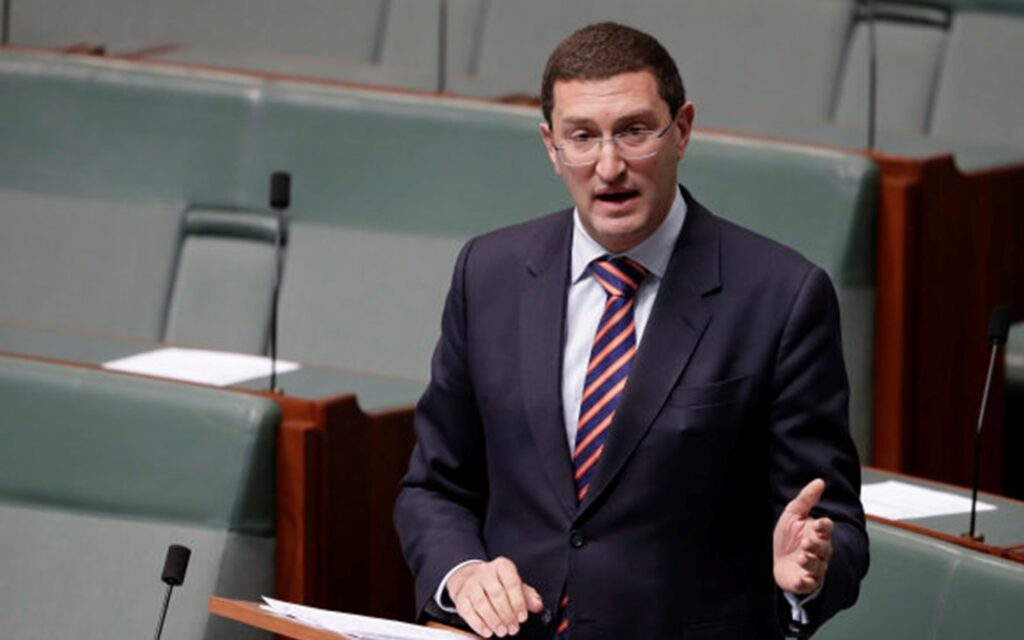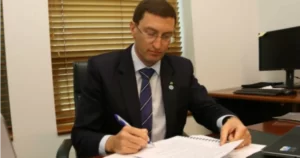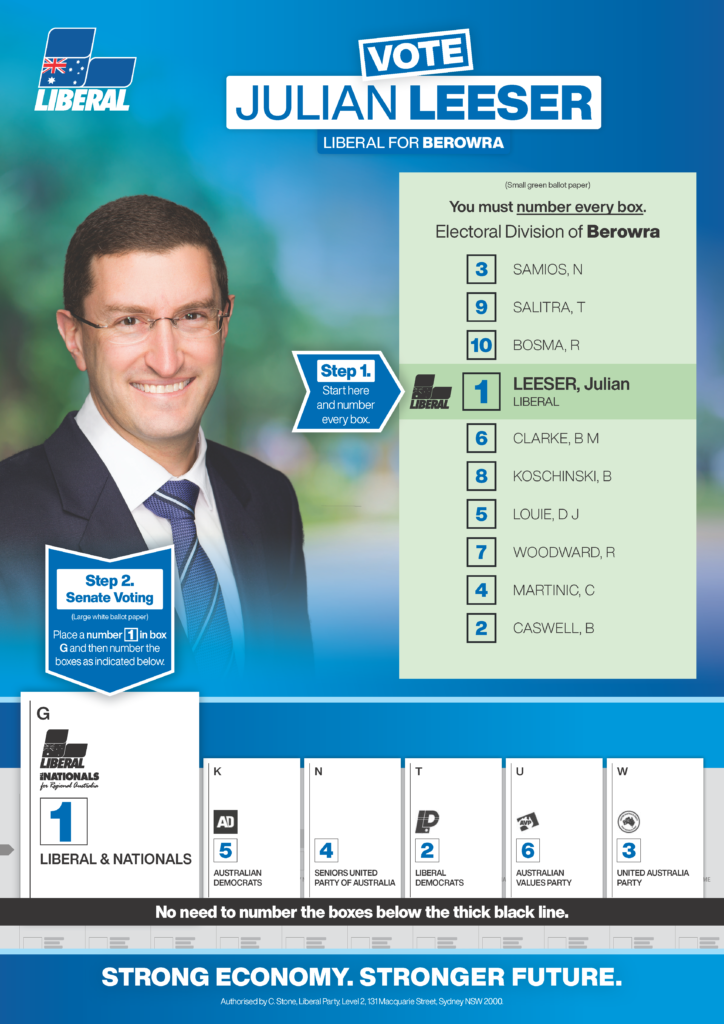I love this country—a country expansive, desolate, beautiful and yet, at times, brutal. A land of extremes unlike any other place on earth. A land where you can have a cyclone and a bushfire on the same day and not be surprised by it. Over thousands of years, Australia’s Indigenous people have made their peace with this land, and it’s become part of their soul. Lives infused by the land, the seasons and the stories of their ancestors.
The 2021 Senior Australian of the Year, Dr Miriam-Rose Ungunmerr Baumann, calls the contemplation of this land ‘deep listening’, ‘dadirri’—the ability to stop, contemplate and listen. To listen to the deep waters of our country, to the present as well as times past; to listen and to hear the beckoning of change. This is such a moment for our country and for the home we share, Indigenous and immigrant, drawn from every creed and from every corner of the world.
Today we are seeking to put before the Australian people a change to our shared national document, the Constitution—the document that belongs to all 25 million of us. First and foremost, I recognise that the Constitution is this nation’s rule book. A sparse document so frugal with language that its words can fit in your pocket. It is the invisible pillar that holds together the great national endeavour that we have the privilege of contributing to.
Australia is one of the oldest continuous democracies in the world, and this is in part due to the work done by the framers of our Constitution in the 1890s. But it’s more than a rule book. The Constitution was also the answer to the deeper challenge that tested the minds of people in Sydney, Melbourne, Brisbane, Adelaide, Hobart and Perth in the 1890s. It was the challenge of how to become one people. One people. To no longer define ourselves by the state we originated from, but to be a part of a nation where others would also have a say. The question of that time was: could we build a federation based on trust where every Australian, no matter where they lived, would have a seat at the table? Through patience, listening, compromise, negotiation and finding common ground, the Constitution answered that question. And it can answer that question again in 2023.
Next week marks 125 years since the June referendum of 1898, the first time Australians went to the polls to vote on becoming one people. And in a lovely coincidence, next week this House will have the opportunity to vote on the next step on that journey, to recognise Aboriginal and Torres Strait Islander peoples in the Constitution.
For a century the question of constitutional recognition has been before us. It stood before us on the day the first Parliament House in Canberra was open, when two Aboriginal men—Jimmy Clements and John Noble—turned up uninvited. Think about that: the opening of the first Parliament House and not one Indigenous Australian invited—and yet they turned up. And despite the half-empty grandstands, the authorities tried to move them along.
And the quest to participate in this democracy continued when the late great William Cooper, the son of Yorta Yorta people, petitioned the king 90 years ago to have seats reserved in this chamber for Aboriginal Australians. Australia can always delight, and I’m sure William Cooper would have been amazed that 11 Indigenous Australians currently sit in our national parliament. Not as the result of a quota, but on their merits; leaders in their own right and embodying the rich plurality of the Australian people. They represent all of their constituents of all races, religions and backgrounds. They are faithful representatives of their parties. They are parliamentarians who happen to be Aboriginal, not representatives of the Aboriginal people of Australia.
Still, the recognition in the Constitution that they talked about for decades has been elusive. It’s a tribute to the wonder and faith of Indigenous Australians that even in times of disappointment they’ve never given up on this democracy. Step by laboured step they’ve sought progress: the 1967 referendum; the bark petitions; the breakthroughs of Neville Bonner and Ken Wyatt, of Nova Peris and Linda Burney—they all speak to it. And through it all—the frustrations, the failures as well as the progress—the times and the seasons hadn’t aligned for constitutional recognition. As Miriam-Rose might say, the time for ripening and gathering had not come. When it did, it was not what anyone expected, least of all me. For that, I marvel at life’s mysteries and the extraordinary people that life has brought across my path.
It was about a decade ago that I sat down with a small group of constitutional conservatives and Indigenous leaders and worked on a proposal for constitutional recognition. The flowery words and symbolism-only approach taken for so long was neither attractive to Indigenous leaders or these conservative thinkers, so we started again. We talked and we listened. The idea we developed was different. It was organic, practical, consistent with our constitutional heritage, and a uniquely Australian idea built for Australian conditions. It was called the Voice. It was a way of giving recognition to Aboriginal and Torres Strait Islanders who have loved this continent since time began. Consistent with our Constitution, a rulebook which creates the institutions of government, the Voice was practical too. It was about creating new structures to improve outcomes for Aboriginal and Torres Strait Islanders.
In the years that followed those early gatherings at Greg Craven’s study at Australian Catholic University, the question was taken back to Aboriginal and Torres Strait Islander Australians. On the way to Uluru and at Uluru, they were asked what they wanted from constitutional recognition. They said they wanted a means to make a difference to life expectancy, to education attainment, to job opportunities, to incarceration rates and to housing and safety too. They wanted a voice. Instead of rejecting the document that was silent about them for so long, Aboriginal and Torres Strait Islander Australians embraced it. As put so eloquently in the Uluru Statement from the Heart:
We seek constitutional reforms to empower our people and take a rightful place in our own country. When we have power over our destiny our children will flourish. They will walk in two worlds and their culture will be a gift to their country.
Empowerment, decision-making, responsibility, accountability, giving back—these are conservative ideals.
The Voice is about Indigenous Australians seeking a greater stake in their own future, no different than any one of us in this chamber or in the communities we represent seek, because it’s only through empowerment and responsibility that accompanies it that a difference can be made. That’s why I’m an enthusiastic supporter of the Voice—because it’s about embracing our shared national project. It’s about Indigenous people in local and regional communities and nationally being consulted, getting involved in issues that affect them and making a difference on the issues that have stubbornly not changed for too long.
In a democracy it is right that every idea is tested and even contested, and that is particularly so with the Constitution. Free speech, freedom of expression, the involvement of citizens to make decisions—this is what we celebrate as citizens of the Commonwealth and as parliamentarians. The proposed constitutional alteration has required us all to reflect. In this debate I believe that, given we are dealing with amendment about our fellow citizens, we all have a responsibility to engage in this debate respectively and, I might add, gently. We can’t let this debate become yet another place of cultural fraying. For about two decades our shared sense of belonging has been fraying. Our willingness to walk in another’s shoes is something few of us contemplate these days. I believe we have a responsibility to do so in this debate. Those advocating for the ‘yes’ case, like me, have a responsibility to engage with the legitimate questions and doubts that many Australians have. Those advocating for the ‘no’ case have a responsibility to hear the aspirations of Aboriginal and Torres Strait Islander Australians who believe the Voice will make a difference. All of us have responsibility to show goodwill to each other.
In my own case, as I made a decision to move from the frontbench to go to the backbench to prosecute this case, I want to acknowledge the generous personal support I received from my parliamentary colleagues, from my leader, Peter Dutton, and my old boss, Tony Abbott, to so many in the Berowra local Liberal conference and so many of the men and women who sit on this side of the chamber, and indeed the kind words of those from the other side as well. I also want to acknowledge Warren Mundine. He is a passionate and committed leader of the ‘no’ case, but Warren doesn’t miss a chance to send a kind or encouraging word to me. You don’t read about any of that because it doesn’t fit with the narrative about Peter, Tony, Warren, Jacinta, Kerrynne and our party, but that’s my experience. People of goodwill can and do disagree. I believe we need more goodwill in our public debates here, in the media and online because the strength of our country depends on the goodwill between all of us in public life.
It is in the spirit of respectful debate that I want to put the main arguments tonight about why Australians should vote yes at this referendum. The first reason is that the current state of Indigenous affairs is not working. In most referendum debates the argument is put that if it ain’t broke, don’t fix it, and that’s normally a valid and compelling argument. But the system is broken. As a country, despite small progress on some fronts, Indigenous Australians are not enjoying the same opportunities or outcomes as other Australians. The life expectancy of an Indigenous Australian is eight years below that of other Australians. One in two Indigenous Australians live in the most socially disadvantaged areas of the country. Infant mortality is 1.8 times higher for Indigenous Australians than other Australians. The unemployment rate for Indigenous Australians is estimated to be about 30 per cent; that’s nine times higher than the rest of the population. The suicide rate for Indigenous Australians is almost 2½ times that of other Australians. One in five Indigenous households are living in accommodation that does not meet an acceptable standard. This and so much more continues to be a shared national failure.
I believe that the Voice creates the frameworks and structures to make a difference at the local, regional and national level. The Voice will be a place for ministers to road-test policy to ensure it has maximum effectiveness when it’s translated to community. The Voice will be a vital ingredient in helping to close the gap.
The Voice has been called many things by its opponents: a third chamber of parliament; a fourth layer of government; a new House of Lords. I prefer to call it what it is: an advisory body of Aboriginal and Torres Strait Islander Australians, trying to better direct federal government funds to achieve better outcomes. The Voice is advisory. It won’t be Moses handing down tablets from the mountain. The parliament will still be the democratic centre of our national life. The parliament will still be supreme in matters of law and policy. The Voice will advise—just like the security services, the Chief Medical Officer, the Chief Scientist, DFAT and other agencies advise. And it remains with the parliament and the executive to weigh that advice, to consider and reflect on it, and sometimes to reject it, because our duty is to consider the national perspective and the national interest. The same will apply to the local and regional voices. Advice will always be weighed. In fact, the words the amendment uses are ‘make representations’, a much more modest term than ‘advice’. ‘Advice’ implies mandatory consideration, whereas ‘representation’ only implies receipt.
The Voice in its different forms will advise on matters relating to Aboriginal and Torres Strait Islander peoples. It will have no interest in where the Department of Finance purchases its paperclips or its recycled paper, as some have claimed. It will not run programs or dish out grants, and it won’t have interest in submarines, as some ‘no’ advocates suggest, as if our subs are going to be painted with Indigenous designs like the fuselage of a Qantas plane. And if the Voice wants to lambast the RBA on interest rates, I say: join the queue.
Rather, what the Voice will do is to work on making our remote communities safer. It will work to rid communities of nicotine and alcohol and ice. It will work to get children to school and keep them there. It will work to address the terrible rates of infant mortality and renal failure in Indigenous communities. And it will work to create local jobs and industries, so that we can break a culture of welfare dependency. Frankly, it will have too much real work on its hands to worry about the boring culture wars of Twitter.
The Voice is not about two classes of Australians. It’s actually about eliminating the differences in economic and social outcomes that separate Indigenous Australians from other Australians.
Some say that the Voice will give Indigenous Australians a place of privilege. Does anyone really believe that Indigenous Australians occupy a place of privilege? If they do, let them go to Laverton and Leonora; let them go to Ceduna; let them go to Palm Island; let them go to Aurukun; let them go to Alice Springs. There, and in hundreds of communities around Australia, Indigenous people are burnt out from generations of government policy failure. I honour those Indigenous people seeking to make a difference in their communities, as nurses and paramedics, police and community workers, teachers and public servants—working every day, simply for the hope of a better day. The idea of special privilege is nonsense, because in too many places it’s simply about survival.
Tonight I know there are many Liberal and National voters wrestling with how to vote at the referendum. To them I say that the Voice is seeking to accomplish things in accordance with our values and history. We might not trumpet our virtues as others do, but we’ve always been on this journey. Robert Menzies gave Aboriginal people the right to vote in Commonwealth and Territory elections and established AIATSIS, that national treasure that seeks to preserve Indigenous language and culture. Harold Holt brought the 1967 referendum to a successful conclusion. John Gorton appointed the first Minister for Aboriginal Affairs. Malcolm Fraser passed the first land rights act. John Howard made the first attempt at a referendum for constitutional recognition. And Scott Morrison secured the National Resting Place and built a historic partnership with the Coalition of Peaks.
In the months ahead, many will deploy the names of Anthony Albanese and Peter Dutton and others, trying to make this referendum an extension of our day-to-day political debates. It’s not. This is not the choice of politicians. This is the choice given to all of us, as citizens. At the referendum, the burden of responsibility rests on us all. For me, I’m looking forward to supporting the ‘yes’ campaign. It will be a journey that I hope to share with Australians from all walks of life, particularly from my community. On referendum day, my wife, Joanna, and I will walk to the end of our street to the local school, where we’ll help set up and work on a booth. On that day, we’re going to bring biscuits, sandwiches, refreshments and drinks for the workers on both sides, because no matter what side you’re on in this debate all of us are Australians who love our country and want the best for it. I believe in the Voice. I will campaign for it, and I will vote yes for it, because the time for constitutional recognition and a voice has come.




